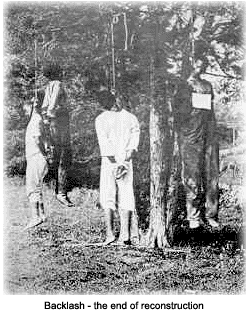In 1874, the Democratic Party returned to power in the House of Representatives, providing an indication of public discontent with the Grant Scandals and the seemingly endless Reconstruction process.
In the disputed Election of 1876, neither candidate received an electoral majority. A special joint commission was established to decide the matter; by an 8-7 vote it was resolved in favor of Republican Rutherford B. Hayes, despite the fact that Democrat Samuel J. Tilden initially received a majority of the popular vote.
A few weeks after taking office, President Hayes issued an order for the removal of the remaining federal soldiers stationed in the South. In April, 1877, the last of the soldiers headed north from South Carolina and Louisiana.
 This move had been stipulated in the Compromise of 1877 and the Republicans hoped that the show of good faith would help their party regain influence in the South. That hope was in vain. The "Solid South" was, and would long remain, solidly Democratic.
This move had been stipulated in the Compromise of 1877 and the Republicans hoped that the show of good faith would help their party regain influence in the South. That hope was in vain. The "Solid South" was, and would long remain, solidly Democratic.
The big losers, however, were the black citizens of the South. Without Republican or federal protections, their rights were drastically restricted.